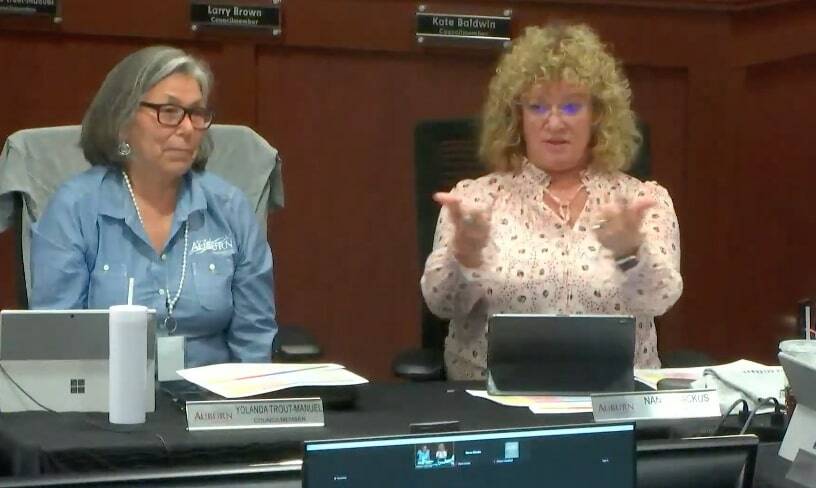The Auburn City Council will continue to meet at 7 p.m. on the first and third Mondays of each month instead of at 5:30 p.m. as succeeding councils have done for decades.
That was among the suggested changes to routine council procedures and processes that members chewed over at a work session Monday evening, but then mostly left in place.
The discussion queued up a back-and-forth between Auburn Mayor Nancy Backus and Councilmember Kate Baldwin that settled who council members could speak with and who they couldn’t.
Baldwin drew the mayor’s pointed scrutiny when she talked about fostering “intergovernmental and employee relations” by having council members talk to employees and hear their concerns.
Backus, who as mayor heads up the city’s administration, reminded Baldwin that the council’s own rules and procedures make it clear that they may not speak with city employees, nor may employees speak with them. Indeed, she said, council members may interact only with directors of city departments, the mayor’s support staff and with the city clerk.
“[Speaking to other employees] is not the role of a council member,” Backus said.
Backus said it is especially important to maintain that separation during negotiations between the city and the collective bargaining units that represent its employees because employees are represented not as individuals, but as a whole at those times.
“The mayor gives that authority to be able to do that, but not to talk — especially not to talk to — [union]-represented employees … That is not something I would recommend, nor would I allow employees to come and talk [with council members]. That’s not how the council and mayor function,” Backus said.
Baldwin responded by “questioning the legality of telling someone who they can or cannot talk to. That is part of freedom of speech, freedom to assemble, which are First Amendment rights. Now, I understand that there needs to be a hierarchy so you can lead the city and administer and manage the city. But the points that I brought up were about being able to hear suggestions and be available for the needs not only of our community, but of our employees.”
“And I am sort of taken aback by your statement and the strength in which you present it, to say that we do not have a right to have those conversations, either by us being available to staff or that you would prohibit staff from speaking to us,” Baldwin said.
Backus referred Baldwin to the council’s own rules and procedures.
“You,” Backus said, “have the ability to talk to directors. That’s it, because you do not direct staff — council does not direct staff.”
Then the mayor clarified the power differential between the city’s legislators and its mayor.
“As mayor, I could make it to where council doesn’t talk to directors, too, but that would be ridiculous. Council has the ability to talk to the directors … The directors will bring the issues to you, and if there’s something that another one of their team has, they will bring it to you, but it is not appropriate for council members to be talking to other members of staff, because there could be that fear of undue influence, not being able to say no to a council member — that’s not appropriate.”
Baldwin argued that Backus’s argument stands only if a council member asks an employee to do a thing, but that if council members merely make themselves available to listen, to hear, “I don’t know if that holds water.”
“Council member,” cautioned Backus, “you are stepping into administrative areas, and council members are not administration. The mayor and the mayor’s office are administration.”
“And I agree that we’re not administrators,” Baldwin responded, “and I’m not trying to be an administrator. What I’m trying to do is make sure that, as council members, we are available to hear and listen, and that’s a very different space than trying to manage, direct, administer and do. It is simply about being able to hear what people bring to us.”
The city attorney’s office noted the delicate nature of balancing First Amendment rights with the running of a city government, but noted that the mayor’s argument is reflected in state statutes regarding the strong-mayor form of government, which is Auburn’s form of government.



